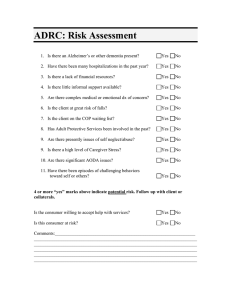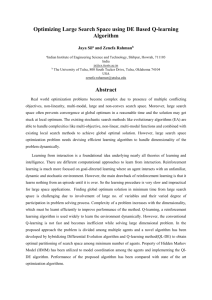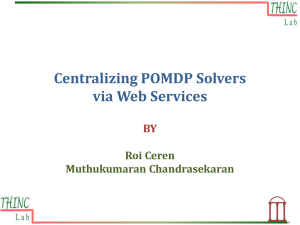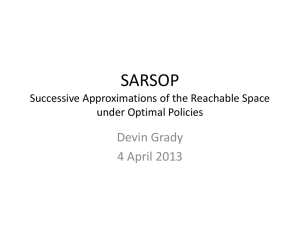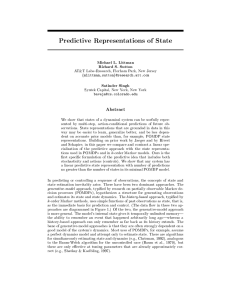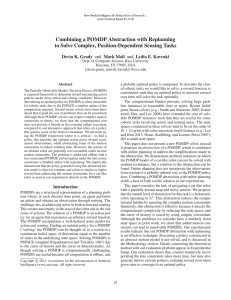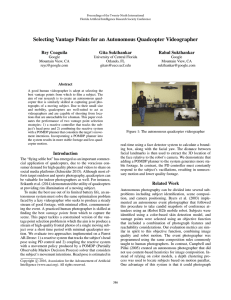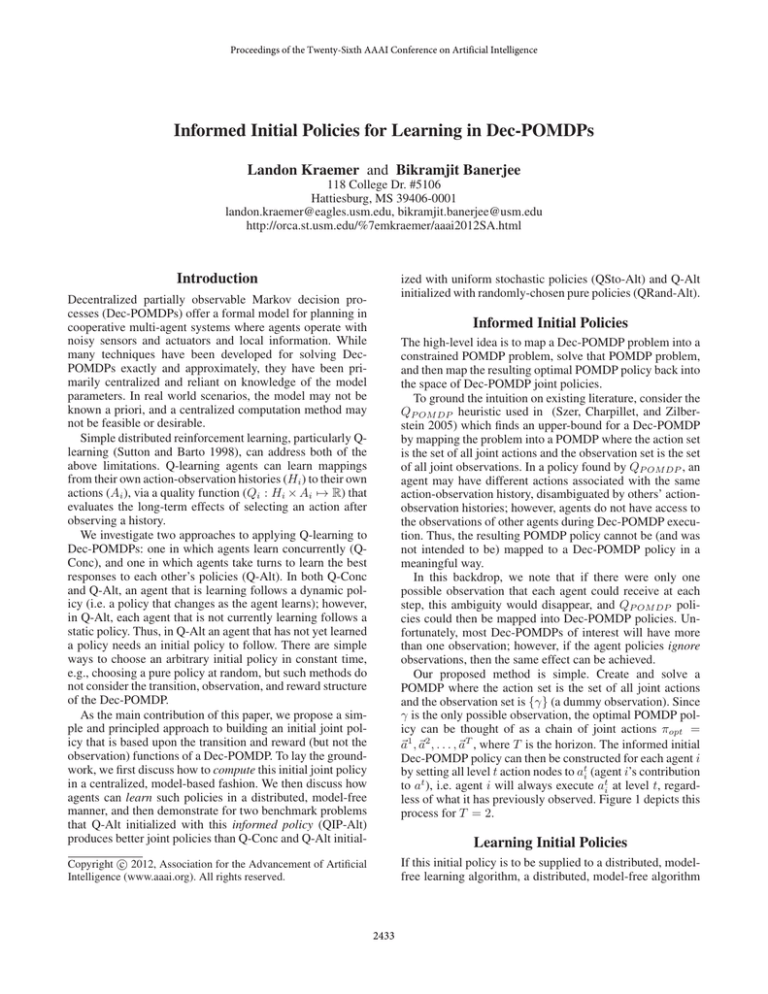
Proceedings of the Twenty-Sixth AAAI Conference on Artificial Intelligence
Informed Initial Policies for Learning in Dec-POMDPs
Landon Kraemer and Bikramjit Banerjee
118 College Dr. #5106
Hattiesburg, MS 39406-0001
landon.kraemer@eagles.usm.edu, bikramjit.banerjee@usm.edu
http://orca.st.usm.edu/%7emkraemer/aaai2012SA.html
Introduction
ized with uniform stochastic policies (QSto-Alt) and Q-Alt
initialized with randomly-chosen pure policies (QRand-Alt).
Decentralized partially observable Markov decision processes (Dec-POMDPs) offer a formal model for planning in
cooperative multi-agent systems where agents operate with
noisy sensors and actuators and local information. While
many techniques have been developed for solving DecPOMDPs exactly and approximately, they have been primarily centralized and reliant on knowledge of the model
parameters. In real world scenarios, the model may not be
known a priori, and a centralized computation method may
not be feasible or desirable.
Simple distributed reinforcement learning, particularly Qlearning (Sutton and Barto 1998), can address both of the
above limitations. Q-learning agents can learn mappings
from their own action-observation histories (Hi ) to their own
actions (Ai ), via a quality function (Qi : Hi × Ai 7→ R) that
evaluates the long-term effects of selecting an action after
observing a history.
We investigate two approaches to applying Q-learning to
Dec-POMDPs: one in which agents learn concurrently (QConc), and one in which agents take turns to learn the best
responses to each other’s policies (Q-Alt). In both Q-Conc
and Q-Alt, an agent that is learning follows a dynamic policy (i.e. a policy that changes as the agent learns); however,
in Q-Alt, each agent that is not currently learning follows a
static policy. Thus, in Q-Alt an agent that has not yet learned
a policy needs an initial policy to follow. There are simple
ways to choose an arbitrary initial policy in constant time,
e.g., choosing a pure policy at random, but such methods do
not consider the transition, observation, and reward structure
of the Dec-POMDP.
As the main contribution of this paper, we propose a simple and principled approach to building an initial joint policy that is based upon the transition and reward (but not the
observation) functions of a Dec-POMDP. To lay the groundwork, we first discuss how to compute this initial joint policy
in a centralized, model-based fashion. We then discuss how
agents can learn such policies in a distributed, model-free
manner, and then demonstrate for two benchmark problems
that Q-Alt initialized with this informed policy (QIP-Alt)
produces better joint policies than Q-Conc and Q-Alt initial-
Informed Initial Policies
The high-level idea is to map a Dec-POMDP problem into a
constrained POMDP problem, solve that POMDP problem,
and then map the resulting optimal POMDP policy back into
the space of Dec-POMDP joint policies.
To ground the intuition on existing literature, consider the
QP OM DP heuristic used in (Szer, Charpillet, and Zilberstein 2005) which finds an upper-bound for a Dec-POMDP
by mapping the problem into a POMDP where the action set
is the set of all joint actions and the observation set is the set
of all joint observations. In a policy found by QP OM DP , an
agent may have different actions associated with the same
action-observation history, disambiguated by others’ actionobservation histories; however, agents do not have access to
the observations of other agents during Dec-POMDP execution. Thus, the resulting POMDP policy cannot be (and was
not intended to be) mapped to a Dec-POMDP policy in a
meaningful way.
In this backdrop, we note that if there were only one
possible observation that each agent could receive at each
step, this ambiguity would disappear, and QP OM DP policies could then be mapped into Dec-POMDP policies. Unfortunately, most Dec-POMDPs of interest will have more
than one observation; however, if the agent policies ignore
observations, then the same effect can be achieved.
Our proposed method is simple. Create and solve a
POMDP where the action set is the set of all joint actions
and the observation set is {γ} (a dummy observation). Since
γ is the only possible observation, the optimal POMDP policy can be thought of as a chain of joint actions πopt =
~a1 , ~a2 , . . . , ~aT , where T is the horizon. The informed initial
Dec-POMDP policy can then be constructed for each agent i
by setting all level t action nodes to ati (agent i’s contribution
to at ), i.e. agent i will always execute ati at level t, regardless of what it has previously observed. Figure 1 depicts this
process for T = 2.
Learning Initial Policies
If this initial policy is to be supplied to a distributed, modelfree learning algorithm, a distributed, model-free algorithm
c 2012, Association for the Advancement of Artificial
Copyright Intelligence (www.aaai.org). All rights reserved.
2433
From the table, we can see that QIP-Alt dominates all other
settings at k = k11 for both domains. Particularly of note
is QIP-Alt’s performance in DecTiger for horizons T=3,4,
where QIP-Alt’s error is zero and its the nearest competitor (Q-Conc) has error ≥ .15. While, the results for BroadcastChannel are not nearly as striking, we note that the error
produced by QIP-Alt is still almost an order of magnitude
less than that of its nearest competitor (QSto-Alt).
Table 2 gives us an upper bound on the number of
episodes required for QIP-Alt to dominate the other three
settings. Such an upper bound represents the smallest value
of k for which QIP-Alt dominates and beyond which it continues to dominate. We can see that QIP-Alt dominates all
other settings well before k11 in both domains.
Figure 1: Conversion of the optimal policy of the constrained
POMDP to a valid Dec-POMDP policy for T=2.
for learning the proposed initial policy is required. It is generally assumed in Dec-POMDPs that the agents cannot observe each others’ actions, so without extra assumptions,
the agents must learn independently. One simple approach
would be concurrent Q-learning, where each agent i tries to
learn Q0i : HiAi × Ai 7→ R for all individual action-only
Ai
i
histories hA
i ∈ Hi and individual actions a ∈ Ai .
Suppose though that each agent can announce the random
seed it will use for exploration before learning begins. Since
rewards are shared and observations are ignored, this would
allow agents to simulate each other’s action selections and
maintain every other agent’s Q0 -values. Thus, each agent can
learn the joint Q0 -Value function (Q0 : H A × A 7→ R) directly, where A is the set of joint actions and H A is the set
of joint action-only histories. This eliminates miscoordination during initial policy learning and can improve the initial
policy learned.
Method
DecTiger
T=3
T=4
T=5
QIP-Alt
0
0
0.0294
Q-Conc 0.1571 0.3561 0.3586
QSto-Alt 1.0539 1.3203 1.2011
QRand-Alt 5.8633 7.9897 5.8213
BroadcastChannel
T=3
T=4
T=5
0.00421 0.0042 0.0038
0.0615 0.0366 0.0303
0.0322 0.0257 0.0231
0.1074 0.1114 0.1538
Table 1: Average relative errors for all horizons and all settings found at k = 107.48 for DecTiger and k = 108.84 for
BroadcastChannel.
Method
DecTiger
BroadcastChannel
T=3 T=4 T=5 T=3
T=4
T=5
Q-Conc 104.4 104.6 106.3 105.73 106.27 106.00
QSto-Alt 104.4 104.4 104.4 105.73 105.46 105.34
QRand-Alt 104.4 104.4 104.4 105.73 105.73 105.34
Experimental Results
Table 2: Upper bound on the number of episodes needed
for QIP-Alt to dominate each setting. Bolded values are the
smallest values for k used in our trials (i.e. k1 ).
In this section, we evaluate the performance of the four different Q-learning settings: QIP-Alt, QSto-Alt, QRand-Alt,
and Q-Conc for the DecTiger and BroadcastChannel benchmark problems. For each domain, we chose eleven increasing values k1 , . . . , k11 and allowed each setting to learn
for k =
The k values
were in the
k1 , . . . , k11 episodes.
ranges 104.4 , 107.48 and 105.34 , 108.84 for DecTiger and
BroadcastChannel, respectively. The k values were rounded
to integers, and derived from experiments with another algorithm (reported elsewhere). k represents the total number of episodes agents are allowed to execute. In Q-Conc
both agents learn simultaneously for k episodes, in QSto-Alt
and QRand-Alt each agent learns exclusively for nk episodes
(where n is the number of agents), and in QIP-Alt each
k̂
agent learns for k̂ + k−
n episodes (where k̂ is the number of
episodes spent concurrently learning the initial policy). Note
that since QIP-Alt must allocate k̂ episodes for learning the
initial policy, QIP-Alt is at a relative disadvantage if the initial policy is not useful because all other settings have k̂ extra steps for learning. We used k̂ = 20000 for DecTiger and
k
k̂ = max(200000, 20
) for BroadcastChannel. In all runs,
we used a learning rate α = .001 and epsilon-greedy exploration with = .05 (Sutton and Barto 1998).
Table 1 gives the relative error (based on known optimal
values), averaged over 50 runs for each setting, domain, and
horizon for the largest values of k investigated (i.e. k11 ).
The worst runtime (for 108.84 and T = 5) was 16948 secs.
Conclusion
We have presented a simple, principled technique to compute a valid Dec-POMDP policy for use as an initial policy
in conjunction with reinforcement learning. Furthermore,
we have demonstrated how to learn such policies in a modelfree manner, and we have shown for two benchmark problems that using these initial policies can improve the outcome of alternating Q-learning. This result is encouraging
and suggests that this initial policy may be useful in other
algorithms (both existing and future) that might require an
initial policy.
Acknowledgment: This work was supported in part by the
US Army under grant #W911NF-11-1-0124.
References
Sutton, R. S., and Barto, A. G. 1998. Reinforcement Learning: An Introduction (Adaptive Computation and Machine
Learning). Cambridge, MA: The MIT Press.
Szer, D.; Charpillet, F.; and Zilberstein, S. 2005. MAA*:
A heuristic search algorithm for solving decentralized
POMDPs. In Proceedings of the Twenty-First Conference
on Uncertainty in Artificial Intelligence, 576–583.
2434


